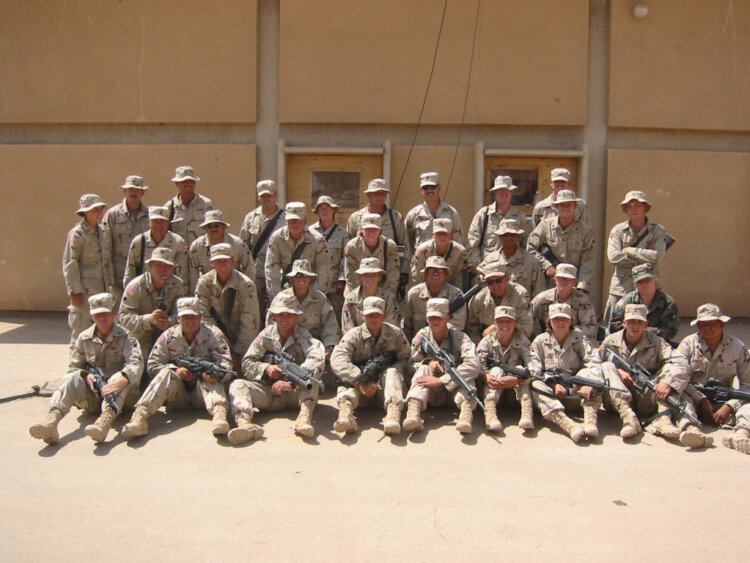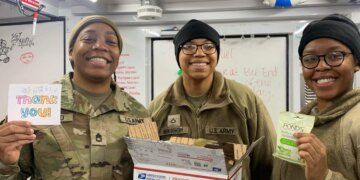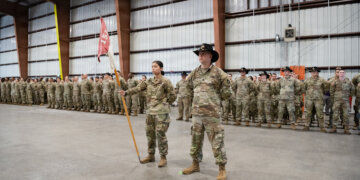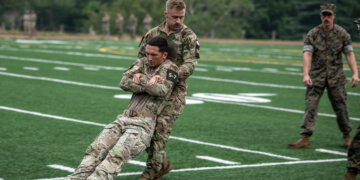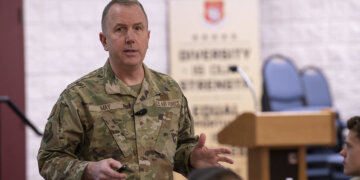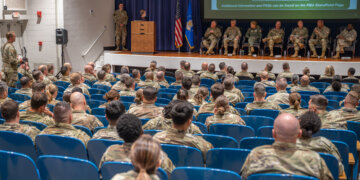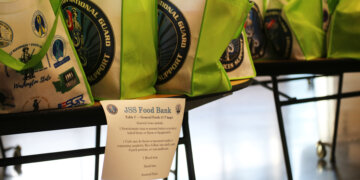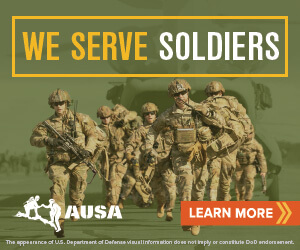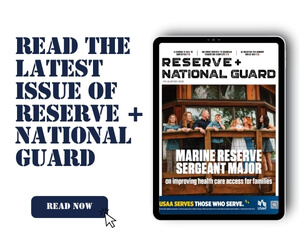Then-2nd Lt. Tracy Graves found herself leading a platoon of semi-trucks in Iraq during that first sweltering summer of 2003 without comprehending how, exactly, she had gotten there.
The masters-level mental health counselor was in her mid-20s and looking for a way to pay off her student loans.
She’s always had second jobs, and in 2000 she enlisted as a truck driver in the South Dakota National Guard.
But soon after enlisting, the nation went to war.
First in Afghanistan after the attacks on Sept. 11, 2001. Then in February 2003, just when Graves was finishing her transportation officer training and planning her return to civilian life in South Dakota, she got a call from her adjutant general.
“He said they were all out of second lieutenants,” she said with a laugh, thinking back to that time two decades ago.
TAG was pulling her out of school early and giving her command of a transportation platoon in the 1742nd Transportation Company.
Once again, the United States was going to war in Iraq.
It’s a war that defined who the National Guard is today. Operation Iraqi Freedom and other follow-on campaigns in the Middle East/North Africa (MENA) region have forced the National Guard to evolve from a strategic reserve to an operational reserve. No longer was the Guard on standby, for this campaign they would be part of the initial phase.
Graves was one of almost 10,000 National Guardsmen called to active service to support Operation Iraqi Freedom during March 2003.
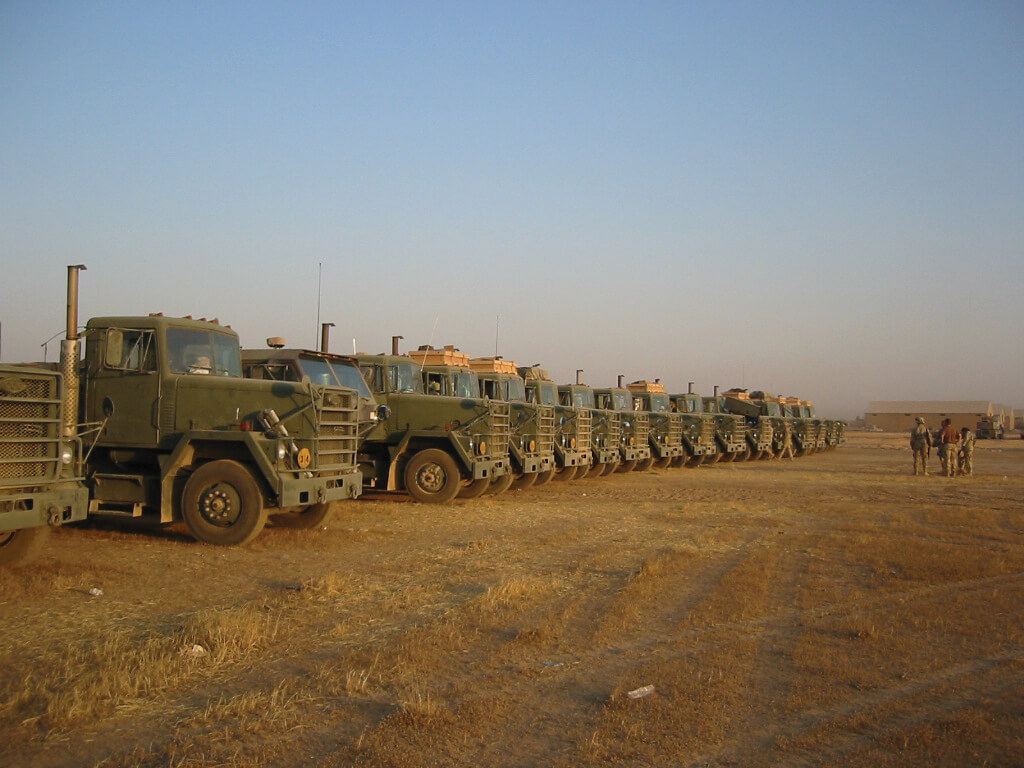
And from her “foxhole” as platoon leader of tractor trailers tasked with delivering vital supplies to forward-deployed units, Graves saw most of the combat theater and worked with dozens of units from active and reserve components.
Now a lieutenant colonel studying at the U.S. Army War College in Pennsylvania, Graves has finally had a few years to put her first – and only – combat deployment in perspective.
Escalating threats in Iraq
As a company of semi-trucks, the 1742nd hauled supplies from Kuwait into Iraq, then set up permanently at what was then called Logistical Support Area Anaconda. From there, Graves and her convoy of 20-30 semi-trucks would travel for eight to 10 days at a time, bringing much needed supplies to units in combat.
“Initially, the logistics were a disaster and there were no capabilities to haul the units what they needed,” Graves said. “The active-duty combat units had no haul assets, so units would beg us, beg us, to haul for them.”
From forward operating base to forward operating base, Graves led semi-trucks through the desert. At times, the convoy stretched for 2 or 3 miles. And no one had a map.
“We were going up to other units and asking ‘Hey have you been to this FOB yet and how do you get there?’” Graves said. “It’s like ‘Oh you’re going to Mosul?’ Go north 200 miles until you see a burnt tree and make a right.’”
As summer bled into fall, Graves had a front row seat to escalating violence as insurgencies began to take root and grow across the country.
RELATED: Marine Corps Reserve veteran reflects on ‘fly on the wall’ view of Iraq War
“Every single month until we left, the threat escalated,” she said. “There were more incidents, more attacks. Every single month it got worse and worse and worse.”
Enemy attacks against coalition forces on the highways usually consisted of small arms fire, rocket propelled grenade (RPG) attacks, and improvised explosive devices (IED).
RPGs and IEDs are the two things that Graves feared the most while she was on the road.
‘It gives me goosebumps’
Nothing that first year of the war escaped Graves and her soldiers. And the once-mental health counselor found herself leading men and women in combat as they completed more missions.
“I would put my truck drivers up against an infantry platoon any day of the week by the time we got out of that theater,” Graves said. “A little different role of course, but I would say we were pretty good tactically, and we were pretty good truck drivers.”
Looking back, Graves considers herself lucky.
“We did not lose a single soldier as a transportation company, but that is not true of everyone, that is absolutely not true of everyone else,” she said.
They had plenty of close calls, and elements of the 1742nd were present during some of the heaviest fighting, including the Battle of Fallujah. They were tasked with delivering blood to combat medical units operating near the frontline and were sent on a quick trip to the warzone in the middle of the night.
Some of the worst fighting occurred on their way home, while the unit was stuck in traffic near Baghdad on their way to Kuwait and that 19-hour flight home.
“It gives me goosebumps thinking about that whole day,” Graves said.
A truck in Graves’ convoy was hit with an RPG round and the driver was grievously wounded.
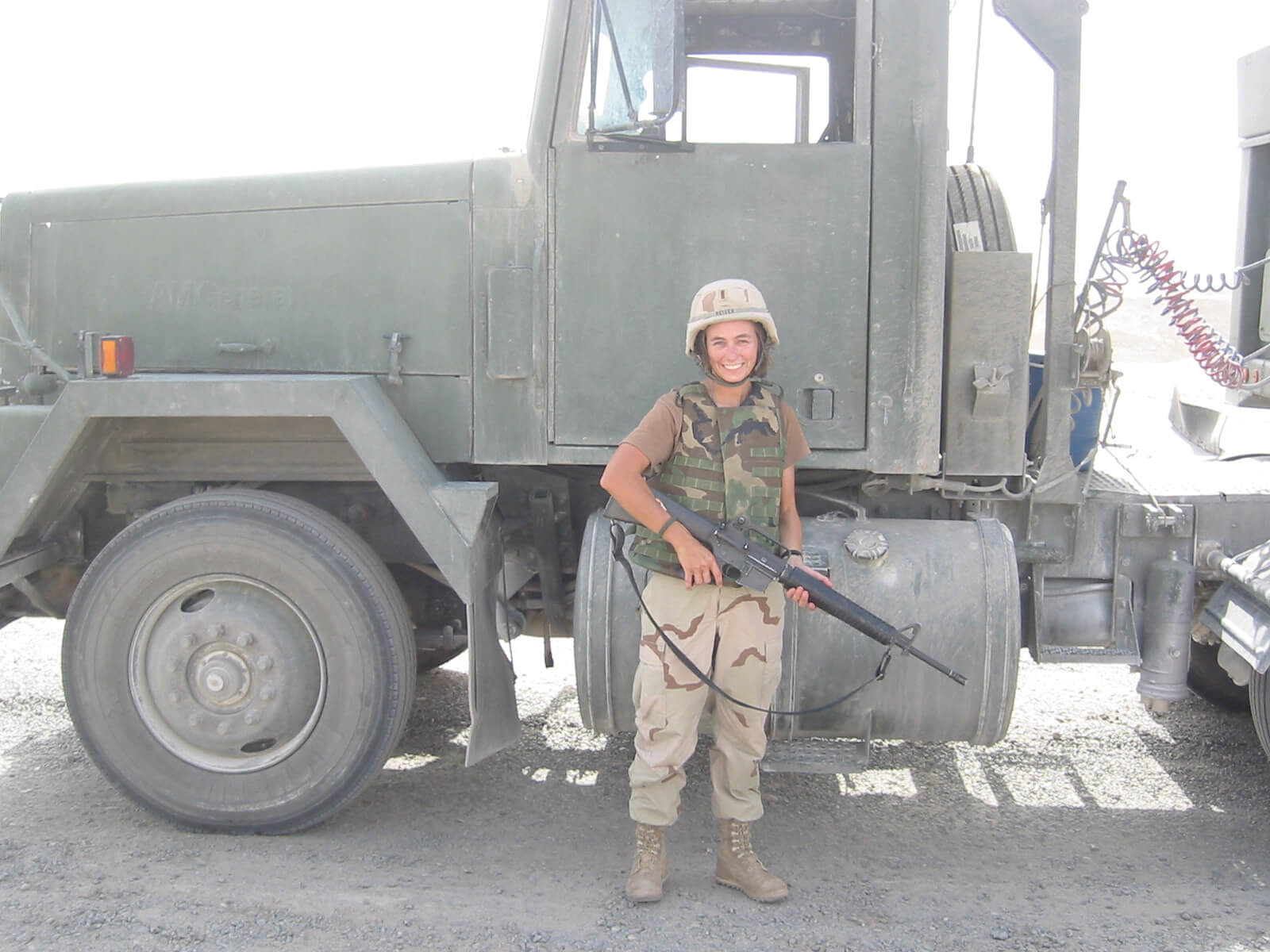
The wounded soldier’s co-driver – a nursing student in civilian life – quickly pulled the soldier out of the burning vehicle and began rendering first aid. The impromptu medic was joined by another soldier, also a nursing student, and together they secured the wounded and readied him for medevac.
“They saved more than one life on more than one occasion,” Graves said.
Becoming a career soldier
Although she initially struggled when she returned to South Dakota, Graves decided to stay in the Guard and become a career soldier.
Now, as a lieutenant colonel, she said her wartime experience made her “more confident” and helped move her career in the right direction.
In that regard, Graves is not unique to many guardsmen of that era.
Because so many National Guardsmen were activated during the first few weeks of Operation Iraqi Freedom, there’s a good chance that the supplies Graves delivered were initially flown into Iraq by other National Guardsmen.
Several Air National Guard units were activated and served on a full-time basis with the start of Operation Enduring Freedom in Afghanistan in 2001.
When war came to Iraq, National Guardsmen were already deployed and working in the CENTCOM area of operations.
“Wartime made you feel a sense of accomplishment, seeing those airplanes take off and getting out on time and you know whatever supplies or cargo they were delivering were needed by the people who were fighting,” said Lt. David Miller, of the West Virginia Air National Guard’s 167th Airlift Wing.
At the time of the invasion, Miller was a junior enlisted airman responsible for maintaining the electrical systems of the C-130 Hercules. He had volunteered to deploy to support first the war in Afghanistan and then the war in Iraq after deciding he needed help paying for college.
From their tent city barracks on Oman’s Masirah Island, Miller and his fellow guardsmen from West Virginia, Texas and Georgia watched the invasion unfold in real time during trips to their make-shift morale area that had one of the base’s few televisions that was hooked up to the Armed Forces Network.
Miller said the team remained too busy to keep close tabs on the action in Iraq.
Still, there was no denying that the supplies being loaded into Miller’s aircraft were on their way to the battlefield.
“We felt like we’re doing our small piece,” he said.
Both Graves and Miller remain in the National Guard today, with Miller serving as a maintenance officer in the West Virginia Air Guard.
To new service members the war is history, Miller said. He and Graves are now the old hands in their units. They each said that their wartime service drastically changed their lives.
And they both said that they’d do it all over again if they could.
Read comments



